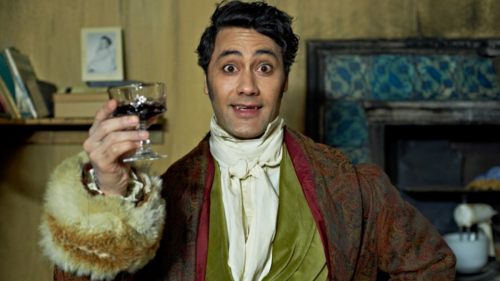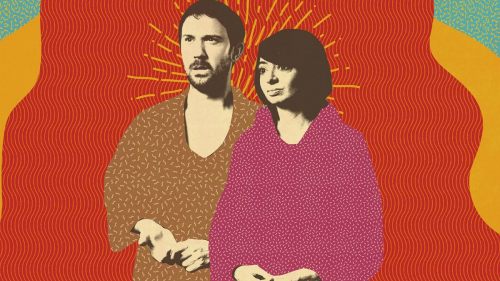Good On Ya, Mate: Taika Waititi’s Very Kiwi THOR: RAGNAROK
Throughout the evolution of the Marvel Cinematic Universe, people have proclaimed that the movies are all “so different” - a claim towards which I've generally been incredulous. Sure, there's some variation between the different films and characters, but they're all riffs on a pretty uniform house style, set in concrete by The Avengers. But recently, Marvel has let its directors out on a longer leash, and that's resulted in better, more unique films.
Black Panther looks like such a film, but we only really have its visual design to go on at this point. What I can definitively state, though, is that Thor: Ragnarok displays nearly all the idiosyncrasies of its director, Taika Waititi. It's a very Taika film, a very Kiwi film, and even in some ways a very Maori film. And yet, still also a Marvel film. Holy shit.
(Spoilers for Thor: Ragnarok follow.)
It starts in the cast. Though both the principal hero and villain are played by bloody Aussies, the support cast is littered with New Zealanders. Most prominent is Karl Urban, lately of Star Trek, Dredd, and Lord of the Rings, as reluctant turncoat Scourge. As Topaz, the Grandmaster's ruthless executioner, Rachel House flexes the deadpan comedic muscles that made her so funny in Hunt for the Wilderpeople. And in cameo, the great Sam Neill plays his own acting counterpart in Asgard, and award-winning comedian Hamish Parkinson (my best friend through high school and university, proving that yes, all Kiwis do know one another) appears in an all-too-brief, transformative role as Beerbot 5000.
Then there’s Taika Waititi himself, stealing the whole dang movie as affable rock monster and warm-up gladiator Korg. One of the Ragnarok's two breakout characters (the other being Tessa Thompson's Valkyrie, obviously), Korg is special because any other director would surely have turned him into a gruff warrior type. A funny gruff warrior type, maybe, but certainly not the soft-spoken bloke found in the film. His friendship with knife-handed Miek, shrugging acceptance of his lot in life, and sudden discovery of revolutionary spirit are all lent an adorable, down-to-earth quality by Waititi’s exaggerated New Zealand accent and restrained physical performance. I want a whole movie about him, just hanging out.
To a Kiwi audience, seeing all these local performers in a Marvel film feels nigh unbelievable. For international audiences, it's a taste of our culture on an unprecedented level. The Lord of the Rings didn’t feel this homegrown, despite its legions of local actors, filmmakers, and locations. It’s all in the directorial voice.
It's important to remember where Taika Waititi comes from. Taika rose up, as many Kiwi artists do, through the country's Fringe and comedy festival circuits, rising to prominence alongside Flight of the Conchords cohorts Jemaine Clement and Bret McKenzie. His maverick entries into New Zealand's wildly popular 48HOURS Furious Filmmaking competition - largely shot and acted entirely by himself - are as silly and ridiculous as his Academy Award-nominated short Two Cars, One Night is classy. And his pre-Thor features - quirky rom-com Eagle Vs Shark, acclaimed comedy-drama Boy, vampire mockumentary What We Do in the Shadows, and breakout hit Hunt for the Wilderpeople - show the evolution of a highly specific filmmaking voice, forged in the flames of grassroots theatre and film.
What's more, Taika's style of comedy is a carefully honed distillation of New Zealand's self-effacing national personality. Where Joss Whedon has characters speak in uniformly witty, improbably quotable one-liners, Taika goes in the opposite direction. His characters stumble over their words, bluster incoherently, and trail off into nothingness; physically, too, they're awkward even (or especially) when showing off. That's such a perfect reflection of New Zealanders: modest and self-deprecating almost to a fault, keeping things real and to ourselves. There's a cheeky, improvisational innocence to it that allows Taika to get away with easily the dirtiest material yet seen in a Marvel film, including some jaw-dropping butt-stuff jokes (the sly “birthday” gag absolutely topping the list). Drawing on influences from New Zealand and abroad, his is very much a comedy of the people, cutting even the mightiest gods down to size.
Such a sense of humour might seem at odds with Thor's Norse mythology and superhero stylings, but it's actually perfect. Taika is a master of comic deflation, frequently undercutting Ragnarok's grandiosity with little identifiable moments of human error. From fire demon Surtur constantly being interrupted at the start of the film, to the Grandmaster’s desperate self-justification at the end, to the transformation of Thor himself into a grinning, handsome pratfall factory, Taika’s style permeates Thor: Ragnarok in a way no other Marvel filmmaker has yet managed. That you can chart a direct line from his shorts to his low-budget comedy features and TV work right into this enormous blockbuster feels like kind of a miracle.
That comic deflation carries over into the themes of the film. Not just in the sense that it's about Thor being humbled, but on a grander scale, too. The film's central revelation - that the legend of a benevolent Odin and Asgard ruling realms joined in peace is a lie, and that those realms were conquered by force - reflects British colonialism so perfectly it virtually had to come from a person of colour in the Commonwealth. Though New Zealand today is markedly fairer in its treatment of its indigenous people than the rest of Britain's English-speaking colonies, its history is still pockmarked with subjugation, violence, and deception, and it's hard not to see the difference between the mythical and “true” Asgards as a representation of that. The film's final image of the now-homeless Asgardians setting space-sail for Earth calls to mind the boats of both the Pacific peoples and the English who came to New Zealand. Some came to find a home, others to build an empire - and in the context of Ragnarok's story, which ends up presenting the Asgardians as both, that duality makes for a breathtaking finish.
I may have left New Zealand in body (for now, at least), but seeing Thor: Ragnarok filled me with a pride in my country that Kiwis are often shy to express. Exiting the theatre, I felt like I'd just seen the most expensive Wellington Fringe show ever. That's enough to make me want to wrap myself in a flag and bellow out “God Defend New Zealand” - in Maori and English - at a full high school assembly roar. But being a Kiwi, I politely put my rubbish in the rubbish bin and my recycling in the recycling bin, and made a discreet exit.
Don't want to toot your horn too loudly, after all.


